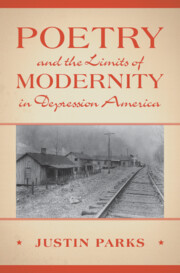Book contents
- Poetry and the Limits of Modernity in Depression America
- Cambridge Studies in American Literature and Culture
- Poetry and the Limits of Modernity in Depression America
- Copyright page
- Dedication
- Contents
- Illustrations
- Acknowledgments
- Introduction
- Part I Historical Materialism and the Materials of History
- Part II Ethnographic Modernity and Its Discontents
- Chapter 4 Vernacular Technologies
- Chapter 5 Interlopers out of a Pale Land
- Chapter 6 Object Lessons
- Coda
- Notes
- Works Cited
- Index
- Recent Books in this Series (continued from page ii)
Chapter 5 - Interlopers out of a Pale Land
Norman Macleod’s Ethnographic Regionalism and Antimodernism in New Mexico
from Part II - Ethnographic Modernity and Its Discontents
Published online by Cambridge University Press: 21 September 2023
- Poetry and the Limits of Modernity in Depression America
- Cambridge Studies in American Literature and Culture
- Poetry and the Limits of Modernity in Depression America
- Copyright page
- Dedication
- Contents
- Illustrations
- Acknowledgments
- Introduction
- Part I Historical Materialism and the Materials of History
- Part II Ethnographic Modernity and Its Discontents
- Chapter 4 Vernacular Technologies
- Chapter 5 Interlopers out of a Pale Land
- Chapter 6 Object Lessons
- Coda
- Notes
- Works Cited
- Index
- Recent Books in this Series (continued from page ii)
Summary
This chapter examines the seldom-discussed poetry and editorial activities of Norman Macleod, a Southwest-based poet who had strong ties to both influential modernists of an earlier generation such as Ezra Pound and Harriet Monroe, and the younger generation of communist-affiliated writers gathered around the little magazine New Masses. Macleod was an internationally visible figure during the Depression decade, when he published in many prominent venues and released two collections of poetry, Horizons of Death (1934) and Thanksgiving before November (1936). The chapter analyzes Macleod’s poems alongside his editorial activities to argue that Macleod challenged modernity’s developmentalist logic as he cultivated a regionalist aesthetics that positioned the Southwest – particularly its Chicanx and Indigenous cultures – as holistic, vital, and integrated, in contrast to the alienation and destruction he associated with the cities of the East. The chapter also scrutinizes the tendency of Macleod’s work toward cultural appropriation in its quasi-ethnographic relationship with the cultures of the Southwest.
Keywords
- Type
- Chapter
- Information
- Poetry and the Limits of Modernity in Depression America , pp. 118 - 140Publisher: Cambridge University PressPrint publication year: 2023

